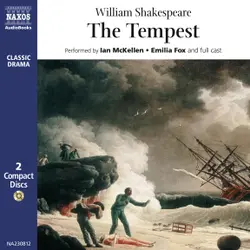William Shakespeare's "Cymbeline" is a masterful blend of romance, tragedy, and comedy that unfolds within the intricate tapestry of the British royal court. Set against a backdrop of mistaken identities and external conflict, the play delves into themes of honor, fidelity, and the complexities of love. Shakespeare employs a rich and lyrical language, weaving poetic dialogue with captivating prose to explore the characters' emotional landscapes. The play is also contextualized by its time, reflecting the era's fascination with nationalism and the idealization of past heroic figures, while subtly critiquing the sociopolitical dynamics of power and gender. Shakespeare, a pivotal figure in English literature, wrote "Cymbeline" during the late stage of his career, around 1609-1610, when his works increasingly explored complex human emotions and social commentary. The playwright's own experiences in a rapidly changing society, marked by the tensions of political power and personal relationships, likely influenced the creation of this intricate narrative. The intermingling of myth and reality in the play may also resonate with Shakespeare's ongoing preoccupations with the nature of truth and perception. "Cymbeline" is highly recommended for readers interested in the richness of Shakespearean themes and the evolution of his narrative style. Its compelling blend of elements makes it an enduring piece that invites audiences to reflect on the nature of love, loyalty, and deception. Engaging with this play will not only enhance one's appreciation for Shakespeare's genius but also offer valuable insights into the human condition.

Les og lytt gratis i 14 dager!
Si opp abonnementet når som helst
Kom i gang med denne boken i dag for 0 kr
- Få full tilgang til alle bøkene i appen i prøveperioden
- Ingen forpliktelser, si opp når du vil
Forfatter:
Serie:
CymbelineSpråk:
engelsk
Format:
- Varighet:
- 123 sider
- Publiseringsdato:
- 15.9.2022
- Forlag:
- DigiCat
- ISBN:
- 8596547313748

50 Masterpieces you have to read before you die
Frances Hodgson Burnett, Homer, Charles Dickens, Lyman Frank Baum, Nathaniel Hawthorne, Thomas Hardy, Robert Louis Stevenson, Henry Haggard, Wilkie Collins, H.G. Wells, Sir Walter Scott, Lucy Maud Montgomery, Louisa May Alcott, Henry Fielding, Mary Shelley, Arthur Conan Doyle, Leo Tolstoy, Euripides, Fyodor Dostoevsky, Alexander Pushkin, James Fenimore Cooper, Daniel Defoe, Joseph Conrad, Jonathan Swift, William Shakespeare, Oscar Wilde, John Bunyan, Charles Darwin, Alfred Tennyson, Bram Stoker, James Joyce, Dante Alighieri, Howard Pyle, Jane Austen, Emily Bronte, Giovanni Boccaccio, Rudyard Kipling
 4.8
4.8B. J. Harrison Reads The Tragedy of Hamlet, Prince of Denmark
William Shakespeare

The Santa's Great Treasure Chest: 450+ Christmas Novels, Tales, Carols & Legends : A Christmas Carol, Silent Night, The Gift of the Magi, Christmas-Tree Land, The Three Kings…
Louisa May Alcott, Charles Dickens, O.Henry, Mark Twain, Beatrix Potter, William Shakespeare, Harriet Beecher Stowe, Emily Dickinson, Robert Louis Stevenson, Rudyard Kipling, Hans Christian Andersen, Selma Lagerlöf, Fyodor Dostoevsky, Martin Luther, Walter Scott, J.M. Barrie, Anthony Trollope, Brothers Grimm, L. Frank Baum, Lucy Maud Montgomery, George MacDonald, Leo Tolstoy, Henry van Dyke, E. T. Hoffmann, Clement Moore, Henry Wadsworth Longfellow, William Wordsworth, Alfred Lord Tennyson, William Butler Yeats, Eleanor H. Porter, Jacob A. Riis, Susan Anne Livingston, Ridley Sedgwick, Sophie May, Lucas Malet, Juliana Horatia Ewing, Alice Hale Burnett, Ernest Ingersoll, Annie F. Johnston, Amanda M. Douglas), Amy Ella Blanchard, Carolyn Wells, Walter Crane, Thomas Nelson Page, Florence L. Barclay, A. S. Boyd, Edward A. Rand, Max Brand, William John Locke, Nora A. Smith, Phebe A. Curtiss, Nellie C. King, Booker T. Washington, Lucy Wheelock, Aunt Hede, Frederick E. Dewhurst, Maud Lindsay, Marjorie L. Pickthall, Jay T. Stocking, Anna Robinson, Florence M. Kingsley, Olive Thorne Miller, M. A. Lane, Elizabeth Harkison, Raymond Mcalden, F. E. Mann, Winifred M. Kirkland, François Coppée, Katherine Pyle, Grace Margaret Gallaher, Elia W. Peattie, F. Arnstein, James Weber Linn, Anne Hollingsworth Wharton, Elbridge S. Brooks, Isabel Cecilia Williams, Anton Chekhov, Armando Palacio Valdés, André Theuriet, Alphonse Daudet, Benito Pérez Galdós, Antonio Maré, Pedro A. De Alarcón, Jules Simon, Marcel Prévost, Gustavo Adolfo Bécquer, Maxime Du Camp, Mary Hartwell Catherwood, F. L. Stealey, Kate Upson Clark, Marion Clifford, E. E. Hale, Willis Boyd Allen, Edgar Wallace, Georg Schuster, Harrison S. Morris, Bjørnstjerne Bjørnson, Matilda Betham Edwards, Angelo J. Lewis, Vernon Lee, Guy De Maupassant, Saki, Bret Harte, Robert E. Howard, William Francis Dawson, Hamilton Wright Mabie, Christopher North, Susan Coolidge, Oliver Bell Bunce, Phillips Brooks, William Drummond, James Russell Lowell, Alfred Domett, Reginald Heber, Dinah Maria Mulock, Margaret Deland, John Addington Symonds, Edward Thring, Cecil Frances Alexander, Mary Austin, James S. Park, Isaac Watts, Robert Herrick, Edmund Hamilton Sears, Ben Jonson, Edmund Bolton, Robert Southwell, C.s. Stone, James Whitcomb Riley, Frances Ridley Havergal, William Morris, Charles Mackay, Harriet F. Blodgett, Eliza Cook, George Wither, John G. Whittier, Richard Watson Gilder, Tudor Jenks, William Makepeace Thackeray, Henry Vaughan, Christian Burke, Andrew Lang, Emily Huntington Miller, Cyril Winterbotham, Enoch Arnold Bennett, Mary Louisa Molesworth, Meredith Nicholson, A.M. Williamson, C.N. Williamson, Elizabeth Cleghorn Gaskell, James Selwin Tait, Booth Tarkington, Evaleen Stein, Frances Hodgson Burnett, Frank Samuel Child, Samuel McChord Crothers, Sarah Orne Jewett, Georgianna M. Bishop, Sarah P. Doughty, John Punnett Peters, Mary E. Freeman, Mary Elizabeth Braddon, Margaret Sidney, Nell Speed, Laura Elizabeth Richards, Arthur Conan Doyle, Willa Cather, Ralph Henry Barbour, Cyrus Townsend Brady, Mary Stewart Cutting, William Douglas O'Connor, Nathaniel Hawthorne, Ruth McEnery Stuart, S. Weir Mitchell, John Leighton, W.H. Murray, Alice Duer Miller, Ellis Parker Butler, Washington Irving

Romeo og Julie
William Shakespeare
 Høyest rangert4.7
Høyest rangert4.7Hamlet : Fully Dramatized Audio Edition
William Shakespeare

The Complete Harvard Classics Collection (Golden Deer Classics) : [51 Volumes + The Harvard Classic Shelf Of Fiction]
Charles W. Eliot, Golden Deer Classics, John Milton, Plato, Benjamin Franklin, Adam Smith, Charles Darwin, Miguel de Cervantes, Virgil, Anonymous, Grimm Brothers, Hans Christian Andersen, Oliver Goldsmith, Dante Alighieri, Pierre Corneille, Jean Racine, Molière, Michel de Montaigne, Voltaire, Niccolò Machiavelli, Confucius, William Shakespeare
 3.4
3.4The Tempest
William Shakespeare

The Greatest Christmas Stories: 120+ Authors, 250+ Magical Christmas Stories
A.A. Milne, Santa Claus, Adelaide Anne Procter, Algernon Blackwood, Alice Duer Miller, Alice Hale Burnett, Amy Ella Blanchard, Andy Adams, Anne Hollingsworth Wharton, Annie Eliot Trumbull, Annie Roe Carr, Anonymous, Anton Chekhov, Arthur Conan Doyle, Banjo Paterson, Beatrix Potter, Berthold Auerbach, Bret Harte, Brothers Grimm, Grimm Brothers, C.H. Mead, Cecil Frances Alexander, Charles Dickens, Charles Edward Carryl, Christopher North, Clement Clarke Moore, Cornelia Redmond, Don Marquis, Dylan Thomas, Edward Payson Roe, Eleanor Hallowell Abbott, Elia W. Peattie, Elizabeth Anderson, Elizabeth Margaret Chandler, Ella Wheeler Wilcox, Ellis Parker Butler, Ernest Vincent Wright, Eugene Field, Evaleen Stein, Florence L. Barclay, Francis Pharcellus Church, Frank Stockton, Fyodor Dostoevsky, Fyodor Dostoyevsky, G.K. Chesterton, George A. Baker, George Augustus Sala, George Robert Sims, H.W. Collingwood, H.P. Lovecraft, Hans Christian Andersen, Harriet Beecher Stowe, Henry van Dyke, Henry Wadsworth Longfellow, Hesba Stretton, Hezekiah Butterworth, Jacob August Riis, James Whitcomb Riley, John Bowring, John Greenleaf Whittier, John Kendrick Bangs, John Masefield, John Milton, John Strange Winter, José María de Pereda, Julia Schayer, Juliana Horatia Ewing, Kate Douglas Wiggin, Katharine Lee Bates, Kenneth Grahame, L. Frank Baum, Lyman Frank Baum, Laura Lee Hope, Leo Tolstoy, Letitia Elizabeth Landon, Lewis Carroll, Lope de Vega, Louisa May Alcott, Lucy Maud Montgomery, L.M. Montgomery, M.E.S, Margaret E. Sangster, Margery Williams, Mark Twain, Martha Finley, Mary E. Wilkins Freeman, Mary Louisa Molesworth, Meredith Nicholson, Montague Rhodes James, Mother Goose, W. H. Corning, Nahum Tate, Nathaniel Hawthorne, Newton Booth Tarkington, O.Henry, Olive Thorne Miller, Paul Laurence Dunbar, Peter Christen Asbjornsen, Ralph Henry Barbour, Richmal Crompton, Robert Browning, Robert Burns, Robert Ervin Howard, Robert Frost, Robert Ingersoll, Robert Louis Stevenson, R.L. Stevenson, Rose Terry Cooke, Rudyard Kipling, S. Weir Mitchell, Saki, Sara Teasdale, Stephen Leacock, Theodore Parker, Thomas Chatterton, Thomas Hardy, Thomas Hill, Thomas Nelson Page, Viktor Rydberg, Washington Irving, Willa Cather, William Dean Howells, William Henry Davies, William J. Locke, William Makepeace Thackeray, William Shakespeare, Zona Gale
 4.4
4.4Othello : Fully Dramatized Audio Edition
William Shakespeare

Hamlet
William Shakespeare
 Ny
NyDer Sturm. Eine Komödie. : Hörbuchzeit: Klassiker der Weltliteratur
Hörbuchzeit, William Shakespeare
 Ny
NyOthello. Eine Tragödie. : Hörbuchzeit: Klassiker der Weltliteratur
Hörbuchzeit, William Shakespeare
